

The shifting standards of Corporate Social Responsibility - Dr. Sheila Killian, FCA - Chartered Accountants Ireland. Corporate Social Responsibility is the ultimate grey area: at best, a messy, organic process of uneven improvement in standards; at worst, a morass of soft law and industry guidelines, self-regulation and self-reporting.
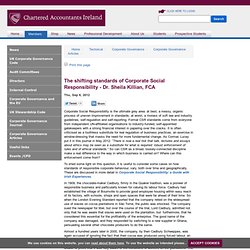
Formal CSR standards come from everyone from independent UN-affiliated organisations to industry-funded, self-appointed gatekeepers with a strong financial interest in papering over the cracks. It is often criticised as a toothless substitute for real regulation of business practices, an exercise in window-dressing that masks the need for more fundamental change. As Cormac Lucey put it in this journal in May 2012: “There is now a real risk that talk, lectures and essays about ethics may be seen as a substitute for what is required: robust enforcement of rules and of ethical standards.” So can CSR as a broad, loosely-connected discipline make a real difference to the way in which business is carried on? Where can this enforcement come from?
Dr. Framework for Corporate Social Responsibility. Corporate social responsibility (CSR) or corporate citizenship entails companies behaving in a socially responsible manner, and dealing with other business parties who do the same.
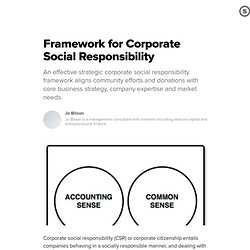
With growing public awareness and demand for socially responsible businesses, it is little wonder that companies of today take corporate social responsibility into account when planning future socially responsible business operations. Often, companies who want to jump onto the corporate social responsibility bandwagon find that a framework is lacking in which to approach CSR head-on. This article aims to do just that, provide a simple three-step framework for engaging in fruitful corporate social responsibility. A strategic corporate social responsibility framework typically aligns community efforts and charitable giving efforts with core business strategy, company expertise and market needs. Develop a Value Proposition Build Sustainability by Engaging the Community. The good company. Criticisms of Corporate Social Responsibility. Milton Friedman wrote in his famous 1970’s article in The New York Times Magazine, that “the one and only social responsibility of business, is to increase profits for shareholders.”
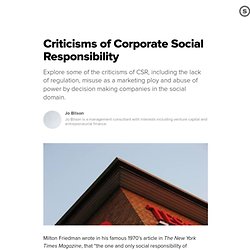
Management’s fundamental goal is to increase value for its shareholders and not any single stakeholder such as solely the socially responsible. It then begs the question, what purpose does corporate social responsibility (CSR) serve in today’s world, if any at all? Criticism Associated with Corporate Social Responsibility (CSR) The concept of CSR has attracted a range of criticisms from some secondary data authors.
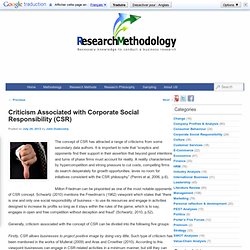
It is important to note that “sceptics and opponents find their support in their assertion that beyond good intentions and turns of phase firms must account for reality. A reality characterised by hypercompetition and strong pressure to cut costs, compelling firms do search desperately for growth opportunities, leves no room for initiatives consistent with the CSR philosophy” (Perrini et al, 2006, p.6). Milton Friedman can be pinpointed as one of the most notable opponents of CSR concept. Schwartz (2010) mentions the Freedman’s (1962) viewpoint which states that “there is one and only one social responsibility of business – to use its resources and engage in activities designed to increase its profits so long as it stays within the rules of the game, which is to say, engages in open and free competition without deception and fraud” (Schwartz, 2010, p.52).
References Related Articles : Corporate Social Responsibility: more than greenwash? Last updated: Jan 2007 In November 2006 the Oxford-based campaign group Corporate Watch published an important critique of Corporate Social Responsibility (CSR).
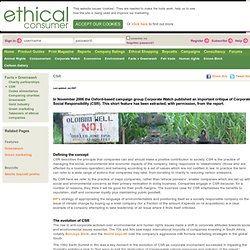
This short feature has been extracted, with permission, from the report. Defining the concept CSR describes the principle that companies can and should make a positive contribution to society. CSR is the practice of managing the social, environmental and economic impacts of the company, being responsive to 'stakeholders' (those who are affected by a business operation) and behaving according to a set of values which are not codified in law.
By CSR here we refer to the practice of major companies, rather than 'ethical pioneers': smaller companies which are set up with social and environmental concerns as their primary motivation in doing business.